七年级module4 Unit 1
- 格式:ppt
- 大小:7.18 MB
- 文档页数:40
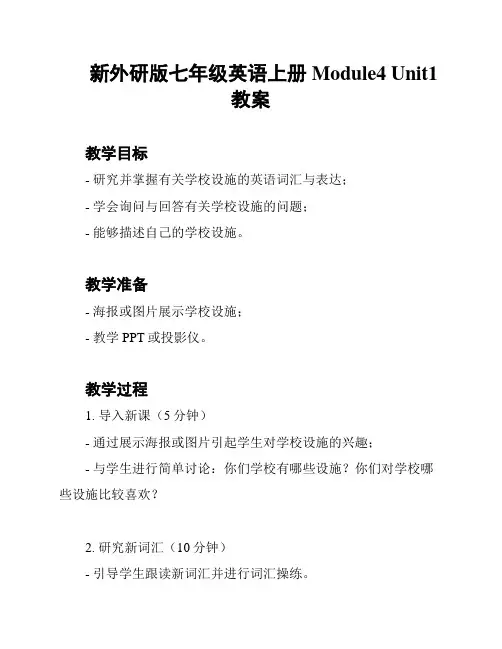
新外研版七年级英语上册Module4 Unit1教案教学目标- 研究并掌握有关学校设施的英语词汇与表达;- 学会询问与回答有关学校设施的问题;- 能够描述自己的学校设施。
教学准备- 海报或图片展示学校设施;- 教学PPT或投影仪。
教学过程1. 导入新课(5分钟)- 通过展示海报或图片引起学生对学校设施的兴趣;- 与学生进行简单讨论:你们学校有哪些设施?你们对学校哪些设施比较喜欢?2. 研究新词汇(10分钟)- 引导学生跟读新词汇并进行词汇操练。
3. 研究句型(15分钟)- 出示PPT或写在黑板上句型:“What facilities are there in your school?” 和“There is/are...”;- 解释句型用法,引导学生进行模仿和问答练。
4. 听力训练(15分钟)- 播放录音材料,要求学生听录音并回答问题,了解学校设施情况。
5. 合作探究(10分钟)- 让学生分小组,互相讨论并编写一篇关于自己学校设施的描述;- 鼓励学生通过合作分享和扩展知识。
6. 小结与展示(5分钟)- 随机选择几组学生进行展示他们写的描述;- 引导学生总结学到的知识点和句型。
7. 课后作业(5分钟)- 布置学生任务:以小组为单位,对比你们学校和我们学校的设施,并写一篇短文进行对比。
教学反思本节课通过展示学校设施、引导讨论、教授新词汇和句型、听力训练以及合作探究等多种教学方法,使学生能够掌握有关学校设施的英语表达。
同时,通过组织小组活动,培养了学生的合作能力和积极参与意识。
整节课时间紧凑,学生参与度高,达到了预期的教学目标。
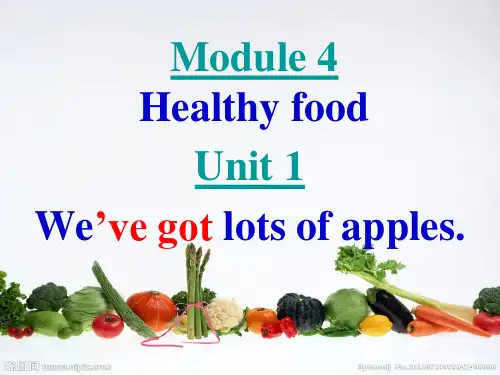
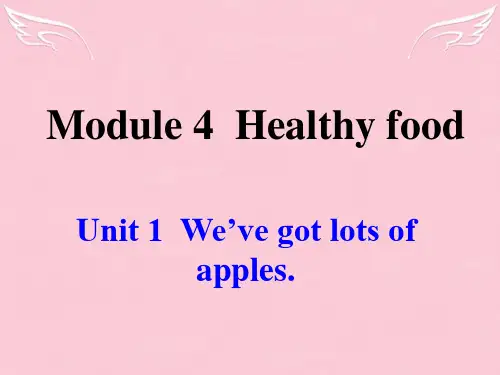
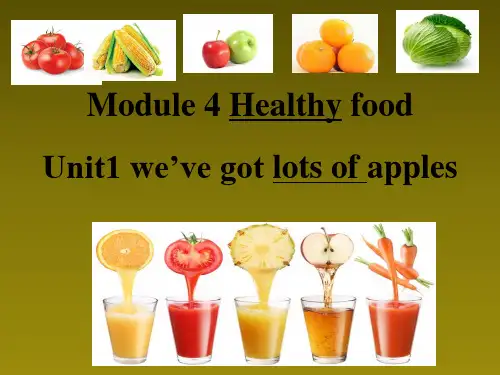
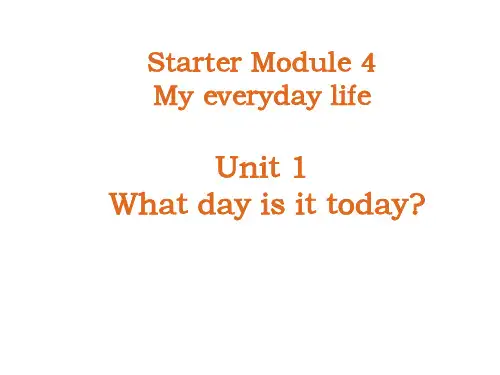
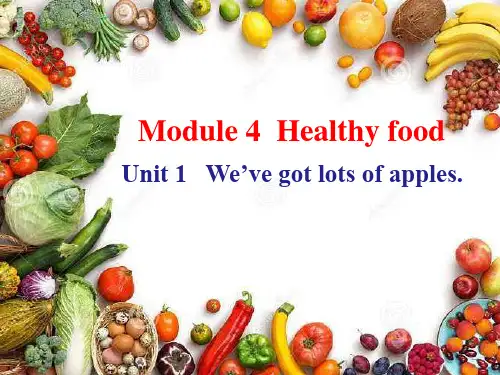
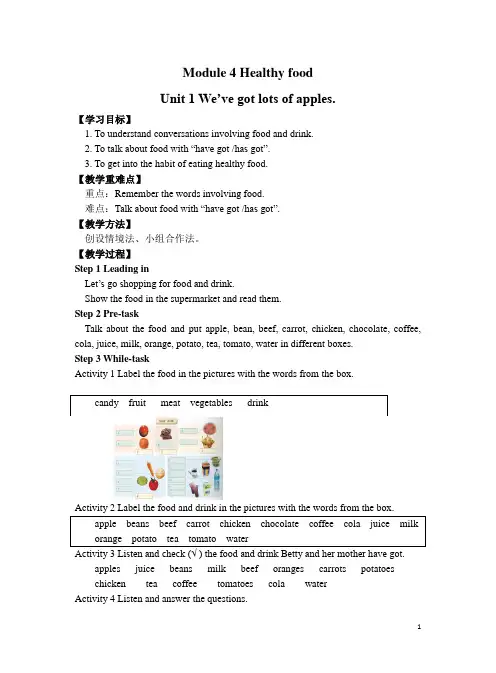
Module 4 Healthy foodUnit 1 We’ve got lots of apples.【学习目标】1. To understand conversations involving food and drink.2. To talk about food with “have got /has got”.3. To get into the habit of eating healthy food.【教学重难点】重点:Remember the words involving food.难点:Talk about food with “have got /has got”.【教学方法】创设情境法、小组合作法。
【教学过程】Step 1 Leading inLet’s go shopping for food and drink.Show the food in the supermarket and read them.Step 2 Pre-taskTalk about the food and put apple, bean, beef, carrot, chicken, chocolate, coffee, cola, juice, milk, orange, potato, tea, tomato, water in different boxes.Step 3 While-taskActivity 1 Label the food in the pictures with the words from the box.candy fruit meat vegetables drinkapple beans beef carrot chicken chocolate coffee cola juice milk orange potato tea tomato waterActivity 3 Listen and check (√ ) the food and drink Betty and her mother have got.apples juice beans milk beef oranges carrots potatoeschicken tea coffee tomatoes cola waterActivity 4 Listen and answer the questions.1. Have they got lots of (许多) apples?2. What kind of meat do they get?Things Tony’s family has got at home Things Tony’s family hasn’t got at homeFoodDrinkThen talk about Tony’s shopping.— Has he got any chicken?—No, he hasn’t.Activity 6 Retell.Tony and Tony’s dad go shopping for food and drink. They haven’t got any ______. They get some ________. They have got some _________ and ______. They haven’t got any _______. They have got some ____________. They have got some _________ for Mum. They haven’t got any _______. ______ is bad for Tony. They haven’t got some ____.Step 4 Post-taskActivity 1 Listen and repeat.Finish Part 7.Activity 2 Listen and choose.1. apples2. beans3. drinks4. potatoesActivity 3 Work in groups.A: Have they got any chocolate?B: Yes, they have./ No, they haven’t.Activity 4 Suppose (假如) a friend is coming for dinner. You and your family are talking about the food and drink.A: Mum, Tom is coming for dinner. Have we got any …?B: Yes, we have got some …A: Have we got any …?B: No, we haven’t. But we have got ……A: Thanks, Mum.Activity 5 Exercise.一、根据汉语完成句子1. 吃太多巧克力对你不好。
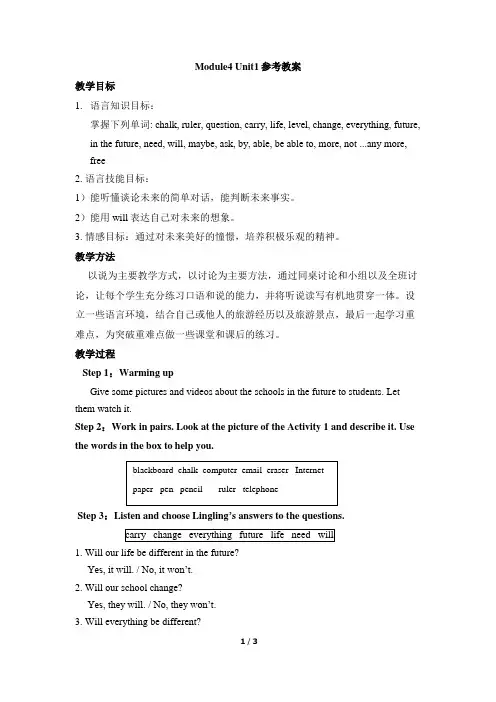
Module4 Unit1参考教案教学目标1.语言知识目标:掌握下列单词: chalk, ruler, question, carry, life, level, change, everything, future, in the future, need, will, maybe, ask, by, able, be able to, more, not ...any more, free2. 语言技能目标:1)能听懂谈论未来的简单对话,能判断未来事实。
2)能用will表达自己对未来的想象。
3. 情感目标:通过对未来美好的憧憬,培养积极乐观的精神。
教学方法以说为主要教学方式,以讨论为主要方法,通过同桌讨论和小组以及全班讨论,让每个学生充分练习口语和说的能力,并将听说读写有机地贯穿一体。
设立一些语言环境,结合自己或他人的旅游经历以及旅游景点,最后一起学习重难点,为突破重难点做一些课堂和课后的练习。
教学过程Step 1:Warming upGive some pictures and videos about the schools in the future to students. Let them watch it.Step 2:Work in pairs. Look at the picture of the Activity 1 and describe it. Use the words in the box to help you.Step 3:Listen and choose Lingling’s answers to the questions.1. Will our life be different in the future?Yes, it will. / No, it won’t.2. Will our school change?Yes, they will. / No, they won’t.3. Will everything be different?Yes, it will. / No, it won’t.4. Will students need computer at school?Yes, they will. / No, they won’t.5. Will they carry lots of books to school?Yes, they will. / No, they won’t.Answers: 1. Yes, it will. 2. Yes, they will. 3. Yes, it will. 4. Yes, they will.5. No, they won’t.Step 4:Listen and read the Activity 3. And then check (√) the students’ ideas about the future in the box of the Activity 3.Step5:To study Everyday English.¤ Well, I’m not sure.¤ That’s be great!Step6:Complete the passage of the Activity 4 with the correct form of the words and expression from the box.Betty: We’ll always (1) _____ teachers because computers will never be (2) _____ to check the students’ (3) ______ and answer their (4) ________ by (5) __________ or Internet. Will students need to go to school (6) __________? Yes, (7) ________ they will, because school is good fun, but everyone will have lots of (8) ______ time. Answers: (1) need (2) able (3) level (4) questions (5) telephone(6) any more (7) maybe (8) freeStep7:Listen and mark the stress. And then listen and repeat.blackboard computer eraser Internet telephoneStep8:Listen to those phonetic symbols of the Activity 6. And then listen and repeat.Step9:Work in pairs. Ask and answer the questions.1. Will schools be different in the future?2. Will students use books in the future?Step10:Work in pairs. Talk about what your school will be like in ten years.— We will study at home and only go to school for sports and games.—Well, this is good, but I’ll miss my teachers and friends.Step11:Study the following new words.chalk, ruler, question, carry, life, level, change, everything, future, in the future, need, will, maybe, ask, by, able, be able to, more, not ...any more, freeStep12:Explain and study the important and difficult points.1. The usage of word “more”.2. Difference between “in future”and “in the future”.3. The usage of word “free”.4. “in+ some time/ period of time”5. The usage o f word “by”.6. The usage of expression “be able to”.7. The usage of expression “not... any more”.8. The usage of expression “as well”.Step13:HomeworkReview and recite the important points of Unit 1.。
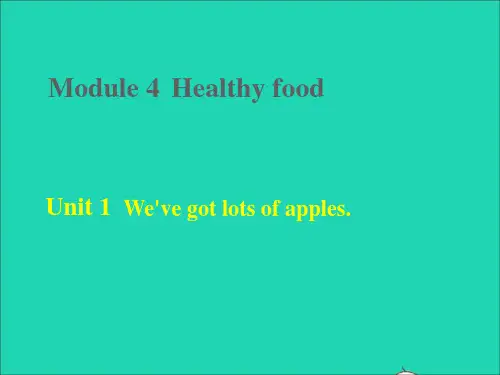
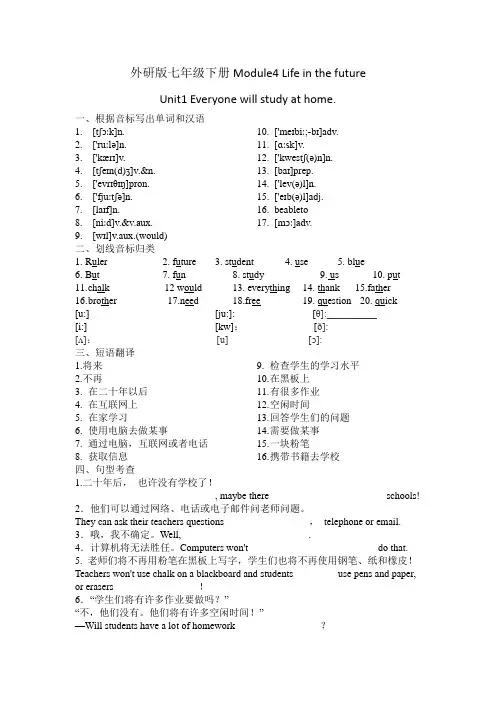
外研版七年级下册Module4 Life in the futureUnit1 Everyone will study at home.一、根据音标写出单词和汉语1.[tʃɔːk]n.2.['ruːlə]n.3.['kærɪ]v.4.[tʃeɪn(d)ʒ]v.&n.5.['evrɪθɪŋ]pron.6.['fjuːtʃə]n.7.[laɪf]n.8.[niːd]v.&v.aux.9.[wɪl]v.aux.(would) 10.['meɪbiː;-bɪ]adv.11.[ɑːsk]v.12.['kwestʃ(ə)n]n.13.[baɪ]prep.14.['lev(ə)l]n.15.['eɪb(ə)l]adj.16.beableto17.[mɔː]adv.二、划线音标归类1.Ruler2. future3. student4. use5. blue6.But7. fun8. study9. us 10. put 11.c halk 12 would 13. everything 14. thank 15.father1.将来2.不再3.在二十年以后4.在互联网上5.在家学习6.使用电脑去做某事7.通过电脑,互联网或者电话8.获取信息9.检查学生的学习水平10.在黑板上11.有很多作业12.空闲时间13.回答学生们的问题14.需要做某事15.一块粉笔16.携带书籍去学校四、句型考查1.二十年后,也许没有学校了!______ ______ ______ _______, maybe there ________ ________ ______schools! 2.他们可以通过网络、电话或电子邮件问老师问题。
They can ask their teachers questions ________ ________,telephone or email. 3.哦,我不确定。
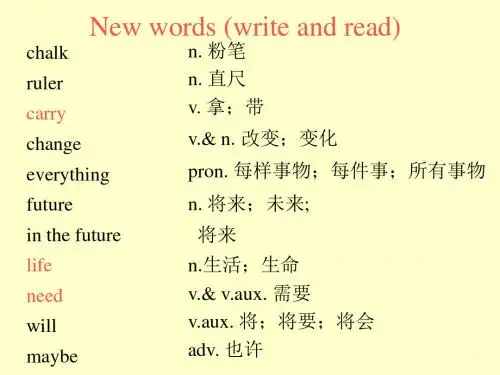
Module 4 Life in the future Unit 1 Everyone will study at home 【课前预习】1、Read loudly about the words and expressions of this unit .2、Read and preview the dialogue of this unit.【课内探究】:预习检测:一、翻译下列短语1. 在将来 _____________2. 有线电视 _____________3. 移动电话 ____________4. 卫星电视 _____________5. 通过电子邮件 _____________6. 使用网络 _____________7. 用粉笔 _____________8. 把……发送给…… _____________9. 我不确定 _____________ 10. 没有人 _____________二、语法练习:用be going to结构填空。
1、I _____ _____ ______ _____ (check) my email thisevening.2、He _____ _____ _____ _____(have) a picnic tomorrow. 总结:be going to的构成形式是____________,其标志词有__________________.【教学目标】(一)语言知识目标1.词汇及短语:will,cell phone, life, no one ,in thefuture.2.语法:will+动词原形表达一般将来时。
(二)能力目标通过听说练习,提高学生的听力、口语表达能力及交流合作能力。
(三)情感目标锻炼学生有目的、有计划地做事,使学生形成自主学习的能力,养成合理安排自己的好习惯。
【听力训练】一、Listen to the tape and check the true sentences for Daming and Betty.【对话处理】一、Listen to the tape again ,and finish the following questions.1、Will students go to school in the future?Yes,they will/No,they won’t.2、Will they study at home ?Yes,they will/No,they won’t.3、Will everyone send their homework by email?Yes,they will/No,they won’t.4、Will there be teachers?Yes,there will/No,there won’t.5、Will there be computers in school?Yes,there will/No,there won’t.6、Will we read books in the future?Yes,we will/No,we won’t.7、Will teachers use a blackboard and chalk?Yes,they will/No,they won’t.8、Will students use paper ,pencils and pens?Yes,they will/No,they won’t.二、读后学,重点知识讲解。
Unit1 核心词汇讲解1.food / fuːd/ n. 食物,食品。
大多数情况下为不可数名词,但当表示特定种类的食物,即表示物品的种类时为可数名词,类似的词还有drink, fruit, fish等。
The food here is delicious. 这儿的食物很好吃。
【拓展】食物类词汇小结:dumpling 饺子rice 大米;米饭noodle 面条sandwich 三明治hamburger汉堡包pizza 比萨2.drink / drɪŋk/ n. 饮料。
作名词“饮料〞讲时,一般为不可数名词,但是表示“一杯或一份饮料、酒水时,为可数名词。
这是一个固定用法,一般在前面加a, 即 a drink。
Let’s go for a drink. 让我们去喝一杯吧。
【拓展】drink v. 喝固定搭配:drink to 为……干杯,为……祝福。
All raise your glasses and drink to Katie and Tom!大家举杯祝福凯缇和汤姆吧!3.candy / 'kændɪ/ n. 糖果。
【拓展】既可以作可数名词,又可作不可数名词。
表示“一块糖〞用a candy, 表示“一盒糖〞用a box of candy。
candies是其复数形式,表示各种各样的糖。
在英式英语中,多用sweet表示“糖果〞。
Candy isn’t healthy food. 糖果不是安康的食物。
4.meat / miːt/ n. 肉。
The tiger likes to eat meat. 老虎喜欢吃肉。
【拓展】meat 是不可数名词,指各种肉的总称,包括pork猪肉, beef牛肉, chicken 鸡肉等。
pork, beef和chicken都是不可数名词。
chicken还可意为“小鸡〞。
5.chicken / tʃɪkɪn/ n. 鸡肉。
【拓展】为不可数名词,作为食品的鸡肉一律用chicken表示,不管这种肉来自cock还是hen。
Module 4 Unit 1 课时基础练七年级英语上册(含答案解析)外研版Module 4 Unit 1 课时基础练七年级英语上册(含答案解析)外研版一、单项选择1.There are ________ in our school library.A.a lot books B.a lot of books C.lots books D.lots of book 2.There were ________ people in the park, but it was ________ fun. A.so much; too many B.too much; so muchC.too many; so much D.too many; so many3.Our teacher came in ________ a big smile ________ his face. A.has; on B.with; on C.had; in D.with; in4.—I can’t find my dictionary.—You can ________ your teacher for it.A.thank B.help C.get D.ask5.They will ________ the meeting room on time. Don’t worry. A.arrive B.get C.reach D.return二、完形填空It’s a Sunday in summer. Lily and her 6 Tony are at home. “We haven’t got any orange juice at home. Could you go and 7 some ” Lily asks Tony. “I don’t want to go. It’s so 8 ,” says Tony. “ 9this You buy orange juice for me, and you can get an ice cream. Here is the money.” Great! Tony loves ice cream. And 10 ice cream is his favourite. He 11 the money and goes to Mr White’s 12 . When he gets there, he says, “Good afternoon, Mr White. Please give me some orange…” Wait! Orange what Tony can’t 13 what Lily wants. “Does Lily want oranges 14 . I don’t think so. Maybe (也许) she wants orange ice cream,” Tony thinks. Then, Tony 15 home with chocolate ice cream and orange ice cream.6.A.sister B.mother C.brother D.father7.A.buy B.put C.play D.open8.A.cold B.cool C.hot D.warm9.A.How many B.How about C.What colour D.How old 10.A.apple B.milk C.banana D.chocolate11.A.makes B.gets C.brings D.takes12.A.hotel B.shop C.theatre D.farm13.A.spell B.find C.know D.remember14.A.Yes B.No C.Thanks D.Sorry15.A.arrives in B.gets to C.goes back D.goes to三、阅读单选Hello! I’m Li Xiang. This is my school lunch. We can eat rice, chicken and vegetables for lunch. I like tomatoes and eggs. I don’t like carrots.Hi, my name is Jane. This is my school lunch — chicken, carrots, breadand potatoes. Every day we have two hours (小时) for lunch. I like chicken and carrots.Hello! I’m Linda. My school lunch is nice. We can eat sausages (香肠), a tomato and some fruit. The drink is 100% apple juice. I like the juice very much.16.The three students are talking about their ________. A.breakfast B.lunch C.dinner D.schools17.Li Xiang doesn’t like________.A.carrots B.tomatoes C.eggs D.bread18.Jane can eat ________ kinds of food for lunch.A.three B.four C.five D.six19.________ can drink juice at lunchtime.A.Li Xiang B.Jane C.Linda D.No one20.Which of the following is TRUEA.Li Xiang has hamburgers for lunch.B.Jane doesn’t like eating carrots.C.Linda doesn’t like her school lunch.D.The three students all eat vegetables for lunch.试卷第1页,共3页试卷第1页,共3页参考答案:1.B【详解】句意:我们学校的图书馆里有很多书。